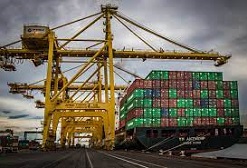In this article the contributor argues that Ethiopia’s reliance on Djibouti Port is unsustainable due to “outrageous costs and illegal practices and embezzlement practices at the highest level”. At present Ethiopia’s imports and exports mainly pass via the port of Djibouti. Reliance on Djibouti has proved costly and unsustainable, however, leading Addis to search for alternatives.
Djibouti is where USAID stores these items for its food assistance programs so it was vital to keep the warehouses fully stocked. But last week, a spokesperson at the time said USAID had determined, in coordination with the Ethiopian government, that a “widespread and coordinated campaign is diverting food assistance from the people of Ethiopia.
Investigations are ongoing and those come on the back of Pangea-Risk report statement last month, that the strategically important Port of Djibouti has grown into a hotbed of rampant corruption, particularly at the highest echelons of the port’s administration. In our investigation conducted by well-placed intelligence sources, the port’s chairman, Aboubaker Omar Hadi, has been named multiple times as being at the centre of these alleged corrupt practices.
These findings are coming to light at the same time as a significant legal development in the United States’ District of Columbia Court, Judge Beryl A. Howell denied the Republic of Djibouti’s request to quash subpoenas targeting 10 banks on September 21, 2023. This ruling, part of Miscellaneous Action No. 2383, has far-reaching implications for the unfolding embezzlement scandal in Djibouti.
The subpoenas were initiated by global port operator DP World, which is seeking to enforce a $485 million arbitration award against the Republic of Djibouti. The award stems from a dispute over the termination of a concession agreement between DP World and the Djibouti government.
The subpoenas target assets exceeding $25,000 that are associated with the Djiboutian state, entities linked to the Republic of Djibouti, or immediate family members of President Ismael Omar Guelleh. The asset search covers transactions and holdings from July 1, 2012, up to the present.
Judge Howell’s decision is a major victory for DP World and a blow to the Djiboutian government’s attempts to obstruct the legal process. It also opens the door to the possibility that DP World may be able to seize assets belonging to the Djiboutian government or its officials.
Of particular significance is the discovery, through Barclays API, of a staggering 338 entities directly linked to the Republic of Djibouti. Spanning various categories, these findings suggest that the Djiboutian government may be using a complex network of shell companies to obscure its ownership of assets.
DP World’s pursuit of this legal action is a courageous stand against corruption and impunity. The company’s commitment to upholding the principles of fairness, transparency, and accountability in international trade and business relationships is commendable.
The outcome of this case will be closely watched by the international community. If DP World is successful in enforcing the arbitration award and seizing assets belonging to the Djiboutian government or its officials, it would send a strong message that corruption will not be tolerated. It would also set a precedent for other companies and individuals who have been wronged by corrupt governments.
The Djibouti embezzlement scandal is a reminder of the importance of fighting corruption and upholding the rule of law. It is also a reminder that even if the country is the largest military landlord, governments can be held accountable.
Analysis and Implications
Judge Howell’s ruling is a significant development in the fight against corruption. It sends a strong message that even powerful governments will not be immune from scrutiny. The ruling also underscores the importance of post-judgment discovery in uncovering hidden assets and exposing corruption.
The discovery of 338 entities directly linked to the Republic of Djibouti is particularly noteworthy. This suggests that the Djiboutian government may be using a complex network of shell companies to obscure its ownership of assets. This type of money laundering is a common tactic used by corrupt officials to hide their ill-gotten gains.
If Africa wants to send a greater message to foreign investors, it needs to stand by international laws. The company is standing up for its rights and seeking justice against a corrupt government. DP World’s actions also send a strong signal to other companies and individuals that they will not be intimidated by corrupt governments.
The outcome of this case will have far-reaching implications for the future of Africa as it struggles to gain investor confidence for its larger than life projects in the energy sector and internal infrastructure development for its inter-continental trade.
“This news also comes at the time, when The African Development Bank has admitted that a $55 million integrity fund launched with great fanfare seven years ago has still not been put into operation and has not disbursed any money on its stated anti-corruption purpose.” President of AfDB Adesina continues to press that “The issue is we have to invest right; we have to make sure the governance environment is right …. “ but who can one trust to do the check and balances.
EDITOR’S NOTE:THE ARTICLE IS PROVIDED BY 251 COMMUNICATIONS – A PR COMPANY BASED IN ETHIOPIA.

